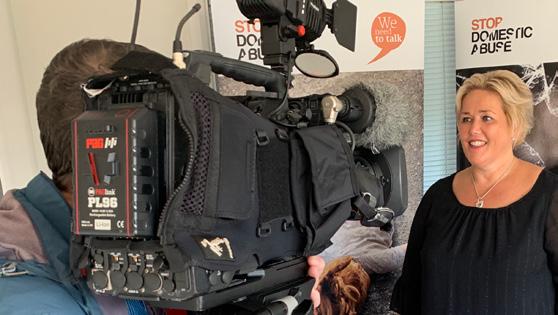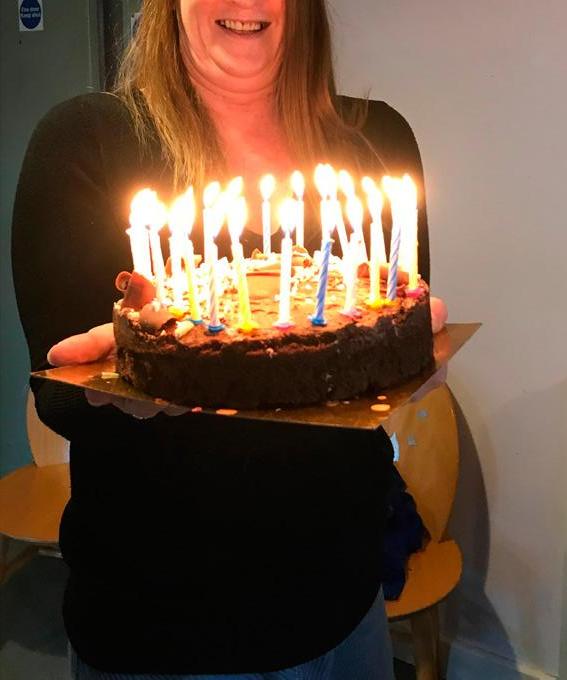
4 minute read
CEO’s Report
Chief Executive Officer Claire Lambon says 2020 has been a year of resilience, adaptability and flexibility. Stop Domestic Abuse consolidated its role as the principal provider of Hampshire’s domestic abuse services after last year’s expansion across all 11 Hampshire districts plus Portsmouth.
We did not know we would experience a new challenge which
Advertisement
would test the organisation’s resilience, adaptability and flexibility on an unprecedented scale.
In early 2020, along with the rest of world, we were watching the
COVID-19 pandemic spread. (See page 7)
Being told to ‘Stay Home’ to stay safe meant seeking sanctuary with home considered a place of safety. For those trapped in intimate relationships with people who use violence and abuse, staying at home was far from staying safe and far from a place of sanctuary.
Working from home
This pandemic is a dynamic situation and our plans have changed according to new information and advice.
I am grateful to my colleagues who remained in client-facing roles in order to keep the refuges open throughout lockdown.
Community-based staff started working from home in late March 2020, providing support via video calls and phone to clients. We successfully adapted group work programmes to be delivered via Zoom.
For younger children where remote support wasn’t suitable, we supported their non-abusive parent so they could help their child. The Up2U Programme for perpetrators of domestic abuse was adapted for remote delivery.
I extend my thanks to my colleagues for their dedication which ensures we continue to support our clients during this pandemic.
Domestic Abuse Bill failed us in some areas
While Covid-19 has focused media attention on domestic abuse, the Domestic Abuse Bill itself was under the spotlight. I have continued to lobby our local MPs in order to influence the Bill.
This Bill is a once-in-ageneration opportunity to deliver a step change in the response to domestic abuse and other forms of violence against women and girls.
It includes some welcome measures, particularly the guarantee that all survivors will be in ‘priority need’ for housing.
There are changes to the family and civil courts (a ban on cross examination and a guarantee that survivors can access special measures in these court settings), a recognition of children in the definition of domestic abuse, a guarantee that survivors can retain a secure lifetime tenancy if they need to move or leave their home due to domestic abuse, a statutory duty on local authorities to provide refuge space and the removal of the so-called “rough sex defence”. Attempts by Conservative MP Philip Davies to include a genderneutral definition of domestic
abuse failed to pass. This is a welcome defeat which recognises that domestic abuse is still a gendered issue.
But there are crucial areas where the bill failed to deliver. That failure will deny support to some of the most vulnerable victims.
MPs ignored women’s “impossible choice”
Sadly, MPs voted against lifting the no-recourse-to-publicfunds rule for migrant women experiencing domestic abuse. This was in spite of campaigning from specialist domestic abuse organisations. Women still face an impossible choice: stay with an abuser or leave with no support.
The Bill contains a statutory duty on local authorities to fund support in accommodation-based services. It must go far further to deliver safety and support. And the lack of funding underpinning the Bill remains a severe concern.
I am also disappointed that the Bill does not clarify that councils are obliged to fund specialist refuge services supporting women and children escaping abuse.
Long-term, sustainable funding for all specialist services must be delivered alongside the Bill. Women’s Aid Federation of England estimates that an investment of £393m for specialist women’s domestic abuse services is needed per year, including £173m for the national network of refuge services.
Legislation “must go further”
Refuge services operate as a national network, accepting referrals from women and children in any part of the country who need shelter and support. Specialist women’s refuge services are an established, essential element in delivering support to survivors of domestic abuse who are no longer safe at home. A refuge service provides holistic, specialist support to meet the needs of women and children in a safe and secure environment. But this national network of life-saving services has been experiencing a funding crisis for a decade. The Bill had the potential to change this.
I welcome the Bill’s statutory duty on local authorities to deliver support in accommodationbased services, but the future of community-based services is uncertain. There remain questions about how the duty will resolve the challenges facing the national network of specialist women’s refuges and deliver funding for children services, communitybased support, prevention and work with perpetrators.
Domestic abuse legislation must go far further if it is to deliver the changes survivors need.
Help us achieve our goals
We continue to take matters into our own hands and protect our refuges through our Buy a Brick campaign (see page 16) which aims to raise £1m so we can buy a refuge (or refuges) of our own and guarantee a continuous service for women and children fleeing domestic abuse.
We are determined to provide vulnerable families with a safe place to sleep at night and begin their journey to a life free from abuse. We sincerely appreciate your donations to help us achieve this. Claire









